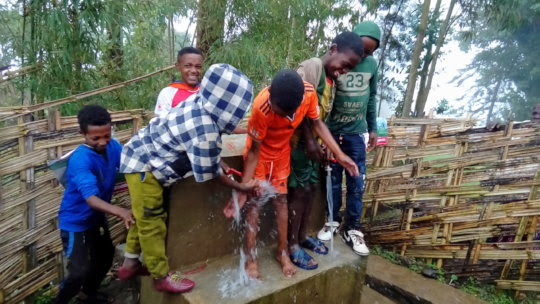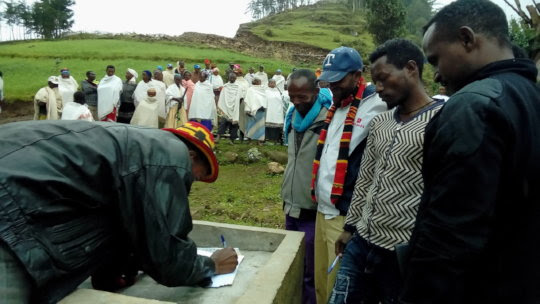Final Report from Mela Gagula, Ethiopia joint project with HOPE Ethiopia, UK, Canada and HOPENZ. Written by Julie Cole, HOPE UK
Each of the 2,400 inhabitants of Mela Gagula is celebrating because clean water has now arrived in their village! They are so thankful! Four springs have been capped. Two reservoirs have been constructed. Nearly six kilometres of pipeline has been laid. Ten water points have been built and nine water basins are available for use. Vitally their water fetching time has been reduced from 3-4 hours to less than 15 minutes. This leaves time for the children to attend school and their parents to earn money to support their families. They now have one of the life’s most essential needs and they are starting to see positive results; there is time and energy to plan for the future! In addition, each of the 480 households in Mela Gagula has now received health, hygiene and sanitation education. These have taken place in large community meetings, and HOPE staff members have also visited each home to provide training. This has taught families the need for digging a pit latrine and managing a waste area to prevent the spread of germs. They have also been shown how to construct hand washing stations and kitchen utensil drying racks. Many households are already benefitting from the water overflow from the taps for their kitchen gardens and are growing a greater variety of nutritious vegetables and fruits. As a result, their health is already improving and there are fewer reported incidences of diarrhoea, other waterborne diseases and eye infections. Twelve self-help groups have also been created for 240 women from Mela Gagula to teach them basic business skills. These women are now starting to save small amounts of money weekly and are increasing their entrepreneurial capacity so that they might start income generating activities to benefit their families. The groups are learning the principles of lending money to one another to fund these small business start-ups. It is reported that social relationships are strengthening and the self-confidence of the women is growing. Many of these women are keen to report to HOPE’s Programme Manager what they have learnt. “I now have an incredible knowledge about how to protect my family from disease. I have learnt about the importance of building a pit latrine, and about personal and environmental sanitation. I have gained experience on how to support my family and now I’m equipped to start a sustainable and profitable business. I can now lead an effective and joyful life.” The Mela Gagula community has been fully involved from the outset of the project and throughout the stages of implementation. Like all of HOPE’s projects, an emphasis was placed on close cooperation and collaboration with the community, ensuring a hands-on ownership of the project by the local men and women. Throughout its 30 years of working in the region, HOPE has found this level of community involvement to be vital in ensuring long-term sustainability. The local community agreed to provide labour and local materials for the construction of the project and now they are taking full responsibility for the installed system, along with on-going support from the local government. Water caretakers have been empowered through thorough training and a Water Committee has been appointed to manage the system for the future. Therefore, an official handover ceremony, which took place last week, is an essential marker so that the community knows the system is now their responsibility and the benefits of having access to clean water is in their capable hands. Whilst the water system is now in full use and the ownership of the system belongs to the community, a HOPE staff member will continue to live in the community for another 21 months. Their role is to continue facilitating the self-help groups for the women, ensuring new businesses are started and money is being generated. They will also continue to provide support to the locally appointed health educators, who will continue to guide the community in their learning of new behaviours to benefit their health. The two-year commitment by HOPE to have a staff member present in the community is now a requirement of the Ethiopian government.




